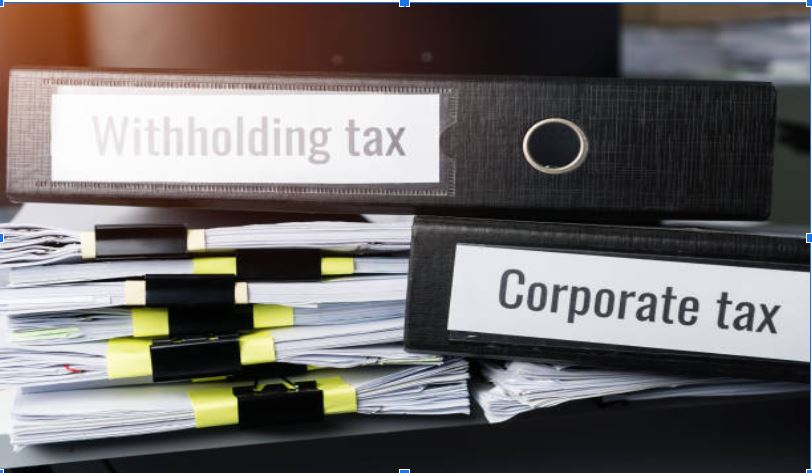Understanding Corporate Tax in the UAE in 2024
admin
February 29, 2024

Understanding Corporate Tax in the UAE in 2024
In a significant shift in its fiscal policy, the United Arab Emirates (UAE) has introduced a Corporate Tax regime, marking a departure from its longstanding tax-free environment for businesses. As of 2024, companies operating in the UAE will be subject to Corporate Tax, a move that signals the country’s evolving economic landscape. This article aims to provide a comprehensive understanding of Corporate Tax in the UAE, its implications for businesses, and essential considerations for compliance.
What is Corporate Tax in the UAE?
Corporate tax, also known as business tax, is a form of direct tax levied on the net income or profit of corporations or businesses. It is typically calculated based on the company’s taxable income after deducting allowable expenses and other deductions.
In the UAE, corporate tax is a relatively new concept, introduced on 1 June 2023, to diversify revenue sources and ensure fiscal sustainability. The UAE corporate tax regime imposes tax on the worldwide income of companies operating within its jurisdiction, subject to certain exemptions and deductions as outlined in the tax laws.
Who is Subject to Corporate Tax in the UAE?
All companies and entities conducting business activities in the UAE are subject to corporate tax unless specifically exempted under the provisions of the tax law. This includes both resident and non-resident companies, branches, and permanent establishments operating within the country. Understanding the criteria for tax residency and assessing tax liabilities are essential steps for businesses to determine their obligations under the UAE corporate tax regime.
How Does Corporate Tax Affect Free Zone Entities?

Free zone entities in the UAE have traditionally enjoyed certain tax privileges, including exemptions from corporate tax. However, recent changes in tax legislation has impacted the tax treatment of free zone entities. While Qualifying free zone persons will enjoy 0% on their Qualifying income, there is a 9% corporate tax on the Taxable income that is not Qualifying Income for free zone businesses.
It is thus essential for free zone entities to assess their tax liabilities and seek professional advice from RSN tax consultants to ensure compliance with UAE tax laws.
Understanding the Role of the Federal Tax Authority (FTA)

The Federal Tax Authority (FTA) plays a crucial role in the implementation and enforcement of corporate tax laws in the UAE. As the regulatory body responsible for tax administration, the FTA oversees registration, compliance, and enforcement activities related to corporate tax. Businesses must liaise with the FTA for guidance on tax matters, including registration, filing requirements, and dispute resolution.
The Role of the Ministry of Finance in Corporate Tax Regulation
The Ministry of Finance plays a pivotal role in formulating tax policies and regulations in the UAE. Working in conjunction with other government entities, the Ministry of Finance ensures that tax laws are aligned with the country’s economic objectives and international standards. Businesses should monitor developments from the Ministry of Finance to stay abreast of changes in corporate tax regulations and compliance requirements.
Navigating the UAE Corporate Tax Law
The UAE corporate tax law provides the legal framework for the imposition and administration of corporate tax in the country. Understanding the provisions of the tax law, including definitions, exemptions, and compliance requirements, is essential for businesses to ensure compliance and avoid potential penalties. Businesses should consult the UAE corporate tax law and seek professional advice to navigate the complexities of tax regulation effectively. RSN is the best tax consultancy firm in the UAE.
Registering and Filing for Corporate Tax in the UAE
Businesses subject to corporate tax in the UAE are required to register for tax purposes and file periodic tax returns with the FTA. The registration process involves obtaining a corporate tax registration number and providing relevant information about the business activities and structure. Additionally, businesses must comply with filing deadlines and reporting requirements to fulfill their tax obligations under the UAE corporate tax regime.
Understanding Corporate Tax Liability and Rates
Determining corporate tax liability involves calculating taxable income based on the applicable tax rate and allowable deductions. The UAE corporate tax law provides guidance on the determination of taxable income, including the treatment of expenses, depreciation, and other relevant factors. Businesses should assess their tax liabilities accurately and apply the appropriate tax rates to ensure compliance with UAE tax laws.
Compliance and Reporting Requirements for Corporate Taxpayers
Compliance with corporate tax laws requires businesses to maintain accurate records, adhere to filing deadlines, and cooperate with tax authorities during audits and inspections. Failure to comply with tax regulations may result in penalties, fines, or other legal consequences. Therefore, businesses should establish robust internal controls and procedures to facilitate tax compliance and mitigate risks associated with non-compliance.
Conclusion
Navigating the corporate tax landscape in the UAE requires a comprehensive understanding of tax laws, compliance requirements, and regulatory frameworks. By staying informed and proactive, businesses can ensure compliance with UAE tax laws and contribute to the country’s economic growth and development.
Do you need help in navigating the robust landscape of UAE corporate tax? RSN is your go-to destination for this and more. Contact us today!
FAQ
Q: What is Corporate Tax?
Corporate Tax is a direct tax imposed on the income or profits of corporations or businesses.
Q: Why is the UAE introducing Corporate Tax?
The UAE aims to diversify revenue sources, reduce reliance on oil revenues, and enhance global competitiveness.
Q: Is the UAE the first country to introduce Corporate Tax?
No, other GCC countries have already implemented similar tax regimes as part of broader economic reforms.
Q: When is the UAE Corporate Tax regime effective?
The UAE Corporate Tax regime is effective for Financial Years starting on or after 1 June 2023.
Q: Who is subject to UAE Corporate Tax?
Juridical persons incorporated in the UAE and foreign juridical persons that are effectively managed and controlled in the UAE are subject to UAE Corporate Tax.
In addition, natural people who conduct business or business activities in the United Arab Emirates, whether directly or through an unincorporated partnership or sole proprietorship, shall be liable to corporate tax.
Q: Will UAE entities owned by UAE or GCC nationals be subject to UAE Corporate Tax?
Yes. The application of UAE Corporate Tax does not differentiate between entities that are locally or internationally owned.
Q: Will UAE Corporate Tax be applicable to businesses in all Emirates?
Yes, UAE Corporate Tax applies uniformly across all Emirates.
Q: Will I have to pay UAE Corporate Tax alongside Emirate level taxes?
Yes, businesses may still be subject to local taxes and fees imposed by individual Emirates.
Q: Will UAE Corporate Tax replace VAT in the UAE?
No, UAE Corporate Tax is separate from VAT and Excise Tax.
Q: Will I have to pay UAE Corporate Tax alongside VAT in the UAE?
Yes, companies must comply with all relevant tax laws and regulations.
Q: Will UAE Corporate Tax replace Excise Tax in the UAE?
No, Excise Tax remains in place alongside Corporate Tax.
Q: Will I continue to pay service fees to the Federal and Emirate Governments now that the UAE has introduced Corporate Tax?
Yes, companies must fulfill their financial obligations to the relevant authorities.
Q: Will I need to consider the UAE’s international agreements for UAE Corporate Tax purposes?
Under the UAE Corporate Tax framework, all current international agreements to which the UAE is a party should be taken into account.
Note: The applicable international agreement may restrict the application of UAE Corporate Tax in the event of a dispute between the Corporate Tax Law and the ability to tax a particular item of revenue.
Q: What will be the role of the Federal Tax Authority?
The administration, enforcement, and collection of federal taxes, including the UAE Corporate Tax, falls under the purview of the Federal Tax Authority.
Q: What will be the role of the Ministry of Finance?
For the purposes of bilateral and multilateral tax agreements as well as the international exchange of information for tax purposes, the Ministry of Finance is the appropriate authority.
Q: What should I be doing to prepare for UAE Corporate Tax?
Companies should conduct assessments of their tax liabilities and seek guidance from tax advisors.
Q: Where can I find the Corporate Tax Law and related implementing decisions?
The Corporate Tax Law and related decisions can be accessed through official channels, including government websites.
Q: When will the Cabinet Decisions and Ministerial Decisions mentioned in the Corporate Tax Law be issued, and will there be any additional Corporate Tax guidance provided?
The pertinent Ministerial and Cabinet decisions that have been issued so far can be found on the website of the CTA.
Also, to give the public more knowledge about how the Corporate Tax Law is applied, the Ministry of Finance and the Federal Tax Authority will keep issuing rulings, guidelines, and other resources.

Recent Posts


















Have Any Questions?
Lorem ipsum dolor sit amet, consectetur adipiscing elit. Ut elit tellus, luctus nec ullamcorper mattis, pulvinar dapibus leo.
- +971 4 342 3373
- +971 55 975 9746







